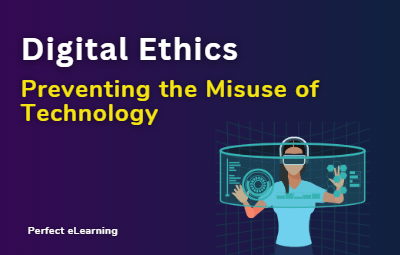

In today's digital age, technology has become an integral part of our lives, and we rely on it for almost everything, from communication to entertainment, education, and work. While technology has revolutionized the way we live, it has also brought new ethical challenges, which can have a profound impact on our society.
What is Digital Ethics?
Digital ethics refer to the moral principles that guide the use of technology in society. It is concerned with the responsible use of technology and the impact it has on individuals, organizations, and society as a whole. Digital ethics also includes the ethical concerns associated with emerging technologies like artificial intelligence, robotics, and big data.
The Importance of Digital Ethics
Digital ethics is essential because technology has the power to shape society in profound ways. The decisions we make about how to use technology can have far-reaching consequences that can impact people's lives. For example, the use of artificial intelligence in hiring practices can perpetuate bias and discrimination. Digital ethics ensures that technology is used responsibly and for the benefit of society.
Examples of Misuse of Technology
Cyberbullying
Cyberbullying is the use of technology to harass, humiliate, or intimidate someone. It can take many forms, such as sending threatening messages, sharing embarrassing photos or videos, or spreading rumors. Cyberbullying can have a devastating impact on people's mental health and can even lead to suicide.
Invasion of Privacy
The widespread use of technology has made it easier for people to collect and share personal information. Unfortunately, this has also led to an invasion of privacy. Companies collect data on individuals to target them with personalized ads, while governments use surveillance technologies to monitor citizens' activities.
Spread of Misinformation
The internet has made it easier for people to access information, but it has also made it easier to spread misinformation. False information can spread rapidly on social media, leading to confusion and mistrust.
How to Prevent the Misuse of Technology
Education
Education is critical in promoting digital ethics. People need to understand the ethical implications of using technology and the impact it can have on society. Educational programs can help people develop critical thinking skills, which are essential in evaluating the credibility of information.
Regulations
Regulations can help prevent the misuse of technology by setting standards for ethical conduct. For example, laws can be enacted to protect individuals' privacy, prevent cyberbullying, and regulate the use of emerging technologies like artificial intelligence.
Corporate Social Responsibility
Companies have a responsibility to use technology ethically. Corporate social responsibility programs can ensure that companies use technology responsibly and consider the impact on society.
Ethical Design
Ethical design is a design approach that considers the ethical implications of technology. It involves designing technology that is user-friendly, accessible, and respectful of people's privacy.
Conclusion
Digital ethics is critical in ensuring that technology is used responsibly and for the benefit of society. The misuse of technology can have far-reaching consequences that can impact people's lives. Preventing the misuse of technology requires a concerted effort from individuals, organizations, and governments. By promoting digital ethics, we can ensure that technology is used to improve people's lives rather than harm them.
FAQs (Frequently Asked Questions)
Q: What is digital ethics, and why is it important?
A: Digital ethics is a branch of ethics that focuses on the responsible use of technology. It is important because as technology advances, new ethical dilemmas arise that can have significant consequences for individuals and society as a whole.
Q: What are some examples of digital ethics violations?
A: Digital ethics violations can range from cyberbullying and online harassment to data breaches and privacy infringements. Other examples include plagiarism, piracy, and the misuse of social media.
Q: How can individuals practice digital ethics in their daily lives?
A: Individuals can practice digital ethics by being mindful of their online behavior and how it affects others. This can include avoiding cyberbullying, respecting other people's privacy, and being aware of the sources of the information they share online.
Q: What are some ethical considerations that businesses should keep in mind when using technology?
A: Businesses should be mindful of the impact that their technology use can have on their customers, employees, and the wider society. This can include protecting customer data, ensuring fair labor practices, and avoiding the use of technology to perpetuate discrimination or bias.
Perfect eLearning is a tech-enabled education platform that provides IT courses with 100% Internship and Placement support. Perfect eLearning provides both Online classes and Offline classes only in Faridabad.
It provides a wide range of courses in areas such as Artificial Intelligence, Cloud Computing, Data Science, Digital Marketing, Full Stack Web Development, Block Chain, Data Analytics, and Mobile Application Development. Perfect eLearning, with its cutting-edge technology and expert instructors from Adobe, Microsoft, PWC, Google, Amazon, Flipkart, Nestle and Info edge is the perfect place to start your IT education.
Perfect eLearning in Faridabad provides the training and support you need to succeed in today's fast-paced and constantly evolving tech industry, whether you're just starting out or looking to expand your skill set.
There's something here for everyone. Perfect eLearning provides the best online courses as well as complete internship and placement assistance.
Keep Learning, Keep Growing.
If you are confused and need Guidance over choosing the right programming language or right career in the tech industry, you can schedule a free counselling session with Perfect eLearning experts.


